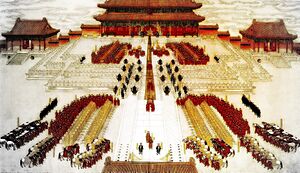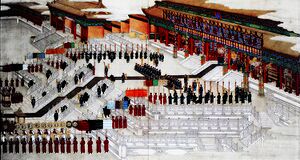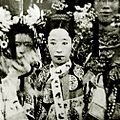Empress Dowager Longyu facts for kids
Quick facts for kids Empress Xiaodingjing |
|||||||||
|---|---|---|---|---|---|---|---|---|---|
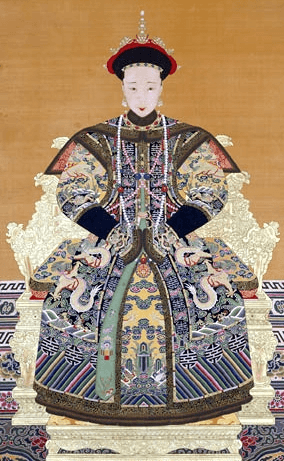 |
|||||||||
| Empress consort of the Qing dynasty | |||||||||
| Tenure | 26 February 1889 – 14 November 1908 | ||||||||
| Empress dowager of the Qing dynasty | |||||||||
| Tenure | 14 November 1908 – 12 February 1912 | ||||||||
| Born | Yehe Nara Jingfen (葉赫那拉·靜芬) 28 January 1868 (同治七年 正月 四日 |
||||||||
| Died | 22 February 1913 (aged 45) Taiji Hall, Forbidden City |
||||||||
| Burial | Chong Mausoleum, Western Qing tombs | ||||||||
| Spouse | |||||||||
|
|||||||||
| House | Yehe Nara (葉赫那拉) | ||||||||
| Father | Guixiang | ||||||||
| Mother | Lady Aisin Gioro | ||||||||
| Chinese name | |||||||||
| Traditional Chinese | 孝定景皇后 | ||||||||
| Simplified Chinese | 孝定景皇后 | ||||||||
|
|||||||||
| Manchu name | |||||||||
| Manchu script | ᡥᡳᠶᠣᠣᡧᡠᠩᡤᠠ ᡨᠣᡴᠣᠩᡤᠣ ᠠᠮᠪᠠᠯᡳᠩᡤᡡ ᡥᡡᠸᠠᠩᡥᡝᠣ |
||||||||
| Romanization | hiyoošungga toktonggo ambalinggū hūwangheo | ||||||||
Jingfen (靜芬; born January 28, 1868 – died February 22, 1913) was an important empress in Chinese history. She belonged to the Yehe Nara clan, a powerful Manchu family. Jingfen was the wife and empress of the Guangxu Emperor. She served as empress from 1889 until her husband passed away in 1908. After his death, she became known as Empress Dowager Longyu.
Empress Dowager Longyu later became a regent, which means she ruled the country for the young Xuantong Emperor from 1908 to 1912. She made a very important decision by signing the document that ended the rule of emperors in China. This decision changed China's history forever. After her death, she was given the special title Empress Xiaodingjing.
Contents
Life as an Empress
Early Life and Family
Jingfen was born on January 28, 1868. Her father was Guixiang, a high-ranking military official. Her paternal aunt was Empress Dowager Cixi, a very powerful woman who ruled China for many years. Another paternal aunt, Wanzhen, was the mother of the Guangxu Emperor. This meant Jingfen was the Guangxu Emperor's cousin.
Marriage to the Emperor
In 1889, Empress Dowager Cixi decided it was time for the Guangxu Emperor to marry. She chose her niece, Jingfen, to be his main wife. Cixi wanted to make her own family, the Yehe Nara clan, even more powerful within the royal family.
Jingfen married the Guangxu Emperor on February 26, 1889. She became empress right after the wedding. Their wedding was a very grand and expensive event. Before the wedding, a fire destroyed a main gate in the Forbidden City. This was seen as a bad sign by many people.
Since the gate could not be rebuilt quickly, Cixi ordered a special tent to be made. This tent looked exactly like the original gate. It was so well made that people could barely tell the difference.
Life in the Palace
After their marriage, the Guangxu Emperor did not like Empress Jingfen very much. He preferred another woman, Consort Zhen. At first, Cixi liked Consort Zhen, but later she became angry with her. Cixi sent Consort Zhen to a special area for empresses who had lost the emperor's favor.
Empress Jingfen often watched the Guangxu Emperor and told Cixi what he was doing. This was because Jingfen did not support the emperor's plans to make big changes to the government in 1898. Cixi then placed the emperor under house arrest.
In 1900, during the Boxer Rebellion, Empress Jingfen traveled with Cixi and the Guangxu Emperor. They went to Xi'an when Beijing was taken over by foreign armies. People who met Empress Jingfen later said she was a kind and pleasant person.
Empress Dowager Longyu's Rule
Becoming Empress Dowager
The Guangxu Emperor and Empress Dowager Cixi both died in 1908, just one day apart. After their deaths, Jingfen became the Empress Dowager. She was given the special name "Longyu," which means "auspicious and prosperous."
Right after the Guangxu Emperor died, Cixi chose Puyi, the emperor's nephew, to be the new emperor. Empress Dowager Longyu did not have any children of her own. So, she adopted the young Puyi as her son.
Even though Cixi had said that women should not rule as regents anymore, Longyu became the main leader in the government. She was asked for her opinion on all important decisions. However, she was new to politics. So, Puyi's biological father, Prince Chun, helped her rule. General Yuan Shikai also helped them.
Ending the Imperial Rule
In 1911, China was facing many changes. General Yuan Shikai advised Empress Dowager Longyu to sign a document for Puyi. This document would mean the emperor would give up his power. Puyi was only five years old at the time.
Empress Dowager Longyu agreed to sign the abdication. But she had some conditions. She wanted to make sure the royal family would be safe and taken care of. Here are some of the agreements she made:
- The royal family could keep their special titles.
- They could keep all their belongings.
- They could stay in the Forbidden City for a while. Later, they would move to the Summer Palace.
- They would receive money every year from the new government.
- The tombs of the emperors would be protected.
- The new government would pay for the Guangxu Emperor's funeral and his tomb.
Later Life and Legacy
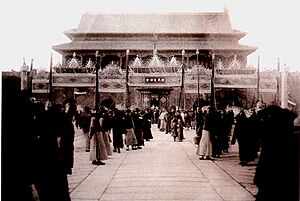
The Qing dynasty ended in 1912, and China became a republic. This meant there would be no more emperors. A few months later, on February 22, 1913, Empress Dowager Longyu passed away in Beijing. She was 45 years old.
She was the only Chinese empress whose coffin was taken to her tomb by train. At her funeral, a high-ranking official praised her. He said she was "most excellent among women." She was buried next to the Guangxu Emperor in the Chong Mausoleum, located in the Western Qing tombs.
Titles Held
- During the reign of the Tongzhi Emperor (1861–1875):
- Lady Yehe Nara (from January 28, 1868)
- During the reign of the Guangxu Emperor (1875–1908):
- Empress (皇后; from February 26, 1889)
- During the reign of the Xuantong Emperor (1908–1912):
- Empress Dowager Longyu (隆裕皇太后; from November 14, 1908)
- During the years of the Republic of China (1912–1949):
- Empress Xiaodingjing (孝定景皇后; from 1913)
Images for kids
See also
 In Spanish: Emperatriz viuda Longyu para niños
In Spanish: Emperatriz viuda Longyu para niños
 | Mary Eliza Mahoney |
 | Susie King Taylor |
 | Ida Gray |
 | Eliza Ann Grier |


